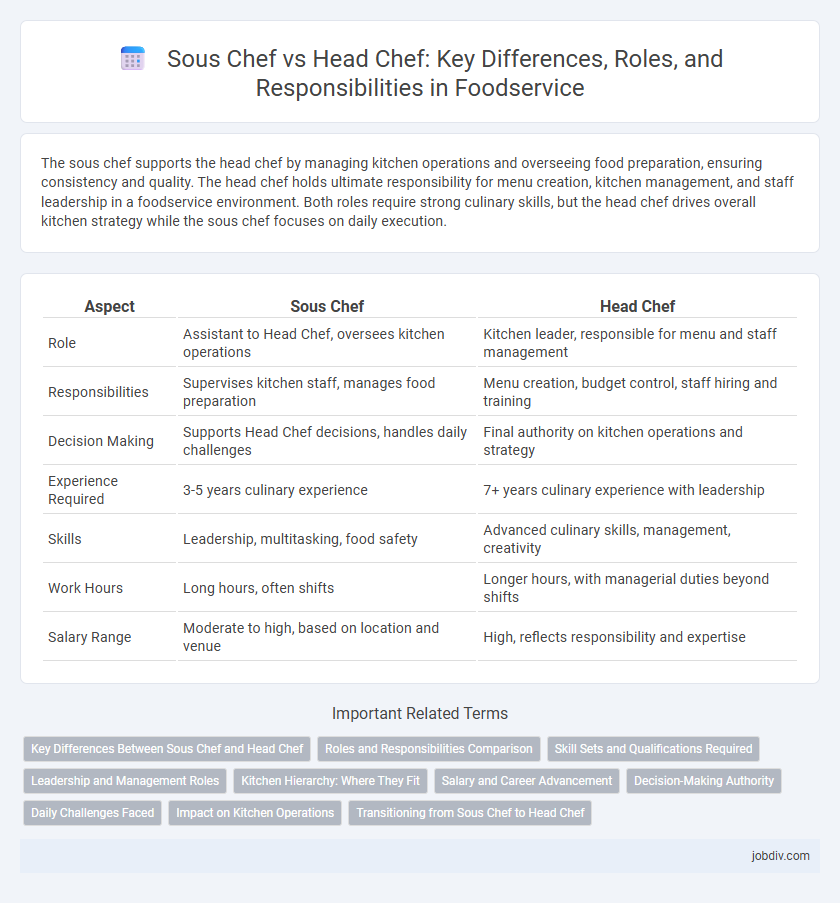The sous chef supports the head chef by managing kitchen operations and overseeing food preparation, ensuring consistency and quality. The head chef holds ultimate responsibility for menu creation, kitchen management, and staff leadership in a foodservice environment. Both roles require strong culinary skills, but the head chef drives overall kitchen strategy while the sous chef focuses on daily execution.
Table of Comparison
| Aspect | Sous Chef | Head Chef |
|---|---|---|
| Role | Assistant to Head Chef, oversees kitchen operations | Kitchen leader, responsible for menu and staff management |
| Responsibilities | Supervises kitchen staff, manages food preparation | Menu creation, budget control, staff hiring and training |
| Decision Making | Supports Head Chef decisions, handles daily challenges | Final authority on kitchen operations and strategy |
| Experience Required | 3-5 years culinary experience | 7+ years culinary experience with leadership |
| Skills | Leadership, multitasking, food safety | Advanced culinary skills, management, creativity |
| Work Hours | Long hours, often shifts | Longer hours, with managerial duties beyond shifts |
| Salary Range | Moderate to high, based on location and venue | High, reflects responsibility and expertise |
Key Differences Between Sous Chef and Head Chef
The Head Chef holds overall responsibility for kitchen management, menu planning, and staff supervision, while the Sous Chef acts as the second-in-command, overseeing daily kitchen operations and stepping in during the Head Chef's absence. Key differences include decision-making authority, with the Head Chef setting culinary direction and the Sous Chef ensuring consistent execution of recipes and standards. The Head Chef typically handles administrative duties, whereas the Sous Chef focuses more on team coordination and quality control during service.
Roles and Responsibilities Comparison
A Sous Chef manages daily kitchen operations and supports the Head Chef by overseeing food preparation, quality control, and staff coordination. The Head Chef is responsible for menu creation, inventory management, and overall kitchen leadership, setting culinary standards and ensuring compliance with health regulations. Both roles demand strong culinary skills, but the Head Chef assumes higher strategic and administrative duties while the Sous Chef focuses on execution and team supervision.
Skill Sets and Qualifications Required
Sous Chefs typically possess advanced culinary skills, expertise in kitchen management, and proficiency in menu development, often requiring a culinary degree and several years of professional kitchen experience. Head Chefs demand comprehensive leadership abilities, strategic planning skills, and mastery in cost control, usually combined with formal culinary education and extensive high-level kitchen management experience. Both roles require strong communication, team coordination, and a deep understanding of food safety standards to ensure efficient kitchen operations.
Leadership and Management Roles
The Sous Chef acts as the primary support to the Head Chef, overseeing daily kitchen operations and ensuring seamless communication between kitchen staff. The Head Chef holds ultimate responsibility for menu creation, kitchen management, and strategic leadership, setting culinary standards and making executive decisions. Effective leadership in foodservice hinges on the Head Chef's vision combined with the Sous Chef's ability to manage personnel and maintain workflow efficiency.
Kitchen Hierarchy: Where They Fit
In the kitchen hierarchy, the Head Chef, also known as the Executive Chef, holds the highest authority, responsible for overall kitchen management, menu creation, and staff supervision. The Sous Chef is the second-in-command, directly supporting the Head Chef by overseeing daily kitchen operations, managing the brigade during service, and ensuring quality control. This structured hierarchy ensures efficient workflow, clear communication, and consistency in food quality within professional kitchens.
Salary and Career Advancement
Sous Chefs typically earn between $40,000 and $60,000 annually, while Head Chefs command higher salaries ranging from $60,000 to $90,000 or more, reflecting their greater responsibility in kitchen management. Career advancement for Sous Chefs often involves gaining experience to step up as Head Chefs or Executive Chefs, with leadership skills and culinary expertise being critical for promotion. In the foodservice industry, Head Chefs have broader opportunities for growth, including restaurant ownership or corporate chef roles, leveraging their extensive management experience.
Decision-Making Authority
The Head Chef holds the ultimate decision-making authority in a foodservice kitchen, overseeing menu planning, staff management, and operational efficiency. The Sous Chef acts as the second-in-command, executing the Head Chef's directives and handling day-to-day kitchen operations. This hierarchical structure ensures streamlined decision-making and effective delegation within the culinary team.
Daily Challenges Faced
Sous chefs manage kitchen operations by coordinating staff schedules and ensuring ingredient inventory levels remain adequate to meet service demands. Head chefs handle overall kitchen management, including menu planning, quality control, and maintaining compliance with health and safety regulations. Both roles face intense pressure during peak hours, dealing with staff conflicts, and adapting to sudden changes in customer volume or special dietary requests.
Impact on Kitchen Operations
The Head Chef directs overall kitchen operations, managing staff, menu planning, and quality control to ensure a seamless culinary experience. The Sous Chef supports the Head Chef, overseeing daily kitchen activities, coordinating food preparation, and maintaining consistency in dish execution. Both roles are crucial for operational efficiency, with the Head Chef setting strategic priorities and the Sous Chef executing tactical responsibilities.
Transitioning from Sous Chef to Head Chef
Transitioning from Sous Chef to Head Chef involves mastering leadership skills, menu development, and kitchen management while maintaining high culinary standards. The Head Chef assumes full responsibility for kitchen operations, staff training, and inventory control, requiring a strategic mindset and effective communication. Successful promotion demands extensive experience, culinary expertise, and the ability to innovate under pressure in a fast-paced foodservice environment.
Sous Chef vs Head Chef Infographic

 jobdiv.com
jobdiv.com